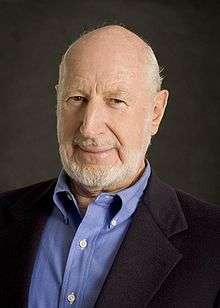Norman Abramson
Norman Manuel Abramson (April 1, 1932)[1] is an American engineer and computer scientist, most known for developing the ALOHAnet system for wireless computer communication.
Norman M. Abramson | |
|---|---|
 | |
| Born | April 1, 1932 Boston, Massachusetts |
| Nationality | American |
| Alma mater | Stanford University Harvard University |
| Awards | IEEE Alexander Graham Bell Medal (2007) |
| Scientific career | |
| Fields | Electrical Engineering and Computer Sciences |
| Institutions | University of Hawaii |
| Doctoral advisor | Willis Harman |
| Doctoral students | Thomas M. Cover Robert A. Scholtz |
Born in Boston, Massachusetts, he received an A.B. in physics from Harvard University (1953), an M.A. in Physics from UCLA (1955), and a Ph.D. in electrical engineering from Stanford University (1958).
Abramson was a research engineer at the Hughes Aircraft Company until 1955, when he joined the faculty at Stanford University (1955–65), was visiting professor at University of California at Berkeley (1966), before moving to University of Hawaii (1968–94), serving as professor of both Electrical Engineering and Computer Science, and Director of Aloha Systems. In 1994 Abramson co-founded Aloha Networks in San Francisco, where he served as a CTO.
His early research concerned radar signal characteristics and sampling theory, as well as frequency modulation and digital communication channels, error correcting codes,[2] pattern recognition and machine learning and computing for seismic analysis. In the late 1960s he worked on the ALOHAnet and continued to develop spread spectrum techniques in the 1980s.
Awards
- 1972: IEEE Sixth Region Achievement Award for contributions to Information Theory and Coding.
- 1980: IEEE Fellow Award for development of the ALOHA-System..
- 1992: Pacific Telecommunications Council 20th Anniversary Award for leadership in the PTC.
- 1995: IEEE Koji Kobayashi Computers and Communications Award for development of the ALOHA System.
- 1998: Golden Jubilee Award for Technological Innovation from the IEEE Information Theory Society, for "the invention of the first random-access communication protocol".[3]
- 2000: Technology Award from the German Eduard Rhein Foundation.[4][5]
- 2007: IEEE Alexander Graham Bell Medal.
- 2011: C&C Prize.
Publications
- Information theory and coding (McGraw-Hill, 1963)
- Computer communication networks (Prentice-Hall, 1973). Editor with Franklin F. Kuo
References
- biography from IEEE (1964)
- U.S. Patent 3,114,130 and U.S. Patent 3,163,848.
- "Golden Jubilee Awards for Technological Innovation". IEEE Information Theory Society. Retrieved July 14, 2011.
- "Award Winners (chronological)". Eduard Rhein Foundation. Archived from the original on July 18, 2011. Retrieved July 14, 2011.
- "Technology Award 2000 - Prof. Dr. Norman Abramson". Eduard Rhein Foundation. Retrieved July 14, 2011.
External links
- Engineering and Technology History Wiki
- Biography from IEEE
- Oral history interview with Severo Ornstein, Charles Babbage Institute, University of Minnesota. Ornstein discusses the computing contributions of Wesley Clark and Norman Abramson.
- Norman Abramson at the Mathematics Genealogy Project
- Author profile in the database zbMATH
| Awards | ||
|---|---|---|
| Preceded by John Wozencraft |
IEEE Alexander Graham Bell Medal 2007 |
Succeeded by Gerard J. Foschini |